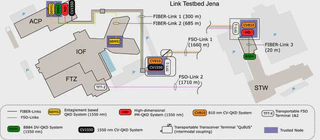Ad-hoc hybrid-heterogeneous metropolitan-range quantum key distribution network
Jan 1, 2025·,,,,,,,,,,,,,,, ,,,,,,,,,,,,,,,,,,,,,,,·
0 min read
,,,,,,,,,,,,,,,,,,,,,,,·
0 min read
Matthias Goy
Jan Krause
Ömer Bayraktar
Philippe Ancsin
Florian David
Thomas Dirmeier
Nico Lennart Döll
Jansen Dwan
Friederike Fohlmeister
Ronald Freund
Thorsten Albert Goebel
Jonas Hilt
Kevin Jaksch
Oskar Kohout
Teresa Kopf
Andrej Krciz
Markus Leipe
Gerd Leuchs
Christoph Marquardt
Karen Lozano Mendez
Anja Milde
Sarika Mishra
Florian Moll
Karolina Paciorek
Natasa Pavlovic Tucakovic
Stefan Richter
Markus Rothe
René Rüddenklau
Gregor Sauer
Martin Schell
Jan Schreck
Andy Schreier
Sakshi Sharma
Simon Spier
Christopher Spiess
Fabian Steinlechner
Andreas Tuennermann
Hueseyin Vural
Nino Walenta
Stefan Weide

Abstract
This paper presents the development and implementation of a versatile ad-hoc metropolitan-range quantum key distribution (QKD) network. The approach presented integrates various types of physical channels and QKD protocols, and a mix of trusted nodes and intermodal coupling. Unlike conventional QKD networks that predominantly depend on either fiber-based or free-space optical (FSO) links, the testbed presented incorporates FSO and fiber-based links, thereby overcoming some inherent limitations. Various network deployment strategies have been considered, including permanent infrastructure and provisional ad-hoc links to eradicate coverage gaps. Furthermore, the ability to rapidly establish a network using portable FSO terminals and to investigate diverse link topologies is demonstrated. The study also showcases the successful establishment of a quantum-secured link to a cloud server.
Type
Publication
New Journal of Physics